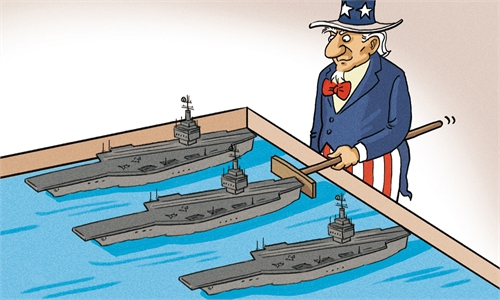;China Just Won the Space Race Against America...NASA is in Shock!
China Space Station Tian Gong is now complete and China is in a position to dominate the future of space and replace America as the number one space nation in the world. But how did this happen? How did China become a supreme space nation? Let's break it down

A staff member stands before a Long March-2F carrier rocket, carrying the Shenzhou-17 spacecraft, on the launch pad encased in a shield at the Jiuquan Satellite Launch Centre in the Gobi desert in northwest China on Oct. 25, 2023. — AFP
SHORTLY after New Year’s Day in 2019, China landed an unmanned spacecraft on the far side of the moon, where no mission had gone before. United States intelligence officials say they did so quietly, taking their time to verify the rover had landed in one piece and protecting themselves from embarrassment. Hours passed before Beijing announced its historic achievement to the world.
The landing was a wake-up call in Washington. China’s space program was advancing with unexpected speed. Beijing would soon assemble in record time a space station orbiting Earth, catching US officials off guard once again.
US intelligence officials acknowledge that China’s sudden advances had surprised them. They are no longer surprised. The intelligence community now assesses with confidence that China is poised to succeed in landing humans on the moon and constructing a permanent base camp at the lunar south pole by the end of this decade, four intelligence officials said, just as American space agency Nasa has fallen behind its own deadlines to achieve similar milestones.
It is the first time intelligence officials have publicly detailed their concerns that China may win the race to return people to the moon and establish a lunar outpost – an achievement that could set back US plans for human space travel for decades to come.
“It wasn’t too long ago that China said they were intending to land by 2035. So that date keeps getting closer and closer,” Nasa administrator Bill Nelson said in an interview. “I take it very seriously that China, in fact, is in a headlong race to get to the moon.”
Neither country plans to stop at the moon. Both see it as a training ground for missions to Mars in the 2030s, vying to make history by sending humans deep into space and landing them for the first time on another planet.
“Before, it was more of an afterthought – China was nowhere to be seen,” one US intelligence official said, speaking on the condition of anonymity to discuss sensitive intelligence matters. “Today, China gets the lion’s share of intelligence attention.”
A second US intelligence official said “space is very evident to China as a place they need to counter US power.”
“They don’t want to be the space power of the 2020s,” the official added. “They want to be the space power of the 21st century, the way we were in the 20th.”
More than half a century after the US put men on the moon, a space race is on for the new millennium. The first great competition of world powers since the end of the Cold War is spurring a new era of exploration that could send humans on missions far beyond those of the Apollo program 50 years ago.
But if the original space race with the Soviet Union was a sprint, this new competition with China is going to be a marathon.
“The United States will continue to lead the world,” Vice President Kamala Harris, who also serves as director of the National Space Council, said in a statement. “Our unrivaled network of allies and partners will power our deep space exploration, inspire the next generation of explorers, and will ensure that advancements in space benefit all of humanity.”
At Nasa, all of these goals are linked, forming a “ Moon to Mars Architecture” that is breaking modern precedent in Washington for space initiatives with sustained support and funding from consecutive Republican and Democratic administrations.
“Is China a catalyst? It should be. Chinese ambitions for both the moon and Mars should be taken very seriously,” said Dean Cheng, senior adviser to the China program at the US Institute of Peace. “Because from their perspective, it’s not just about planting a flag. There’s a whole freight train worth of baggage and meaning associated with both of these missions.”
“This is to establish presence,” Cheng said, “but then to establish the rules.”
Competition is already inching toward conflict closer to home. Since landing a rover on the far side of the moon, China has more than doubled its number of satellites orbiting Earth, and has launched a space plane that remained in low-Earth orbit for several months before ascending and releasing a projectile, defense officials said. Beijing is already fielding weapons in space, including electronic and cyberspace equipment, but also devices that can stalk and latch on to satellites to disrupt their orbit.
Nelson expressed concern that China may reach its lunar milestones first – a development that could allow Beijing to monopolize resources critical to a sustained presence on the surface, such as frozen water hiding in crevices of permanent darkness, and solar energy from mountain peaks bathed in eternal sunlight.
“If China were to land and begin an outpost there, I think it would be a Sputnik moment for the American people,” said G Scott Hubbard, Nasa’s first Mars czar and former director of the Ames Research Center at Nasa who now chairs SpaceX’s crew safety advisory panel. “They could claim it as their own.”
The Chinese Embassy in Washington said in a statement that “outer space is not a wrestling ground, but an important field for win-win cooperation. The exploration and peaceful uses of outer space is humanity’s common endeavor and should benefit all.”
Senior officials in the Biden administration said that China’s program could be the motivation the US needs to reestablish the wonder and drive of spaceflight that once captured the American imagination. “There are positive aspects to competition,” one official said, adding, “one person’s pressure is another person’s inspiration.”
Beijing surprised Washington once again last May, when its military-run Manned Space Agency held a press conference ostensibly to deliver a routine announcement.
Agency officials were introducing three new Chinese astronauts who would depart for China’s Tiangong Space Station the following day – part of a steady cadence of new crew members being sent into orbit every six months, an impressive achievement in and of itself. Then officials added that Beijing intends to land humans on the moon by 2030, moving their timeline up by years.
China’s Academy of Military Sciences has previously said that space “has already become a new domain of modern military struggle.” Neither the China National Space Administration nor the China Manned Space Agency responded to multiple email requests for comment.
China’s public plan is to use robots to scout the south pole for lunar water in 2026 and begin establishing its base there, to be called the International Lunar Research Station, in 2028. Beijing aims to complete a new Long March 10 rocket system for its crewed missions by 2027.
US intelligence officials say it would be “high risk” for the Chinese to attempt their first human landing at the south pole, but also believe Beijing will try to distinguish their first landing from Apollo.
“If there is a prestige goal,” one intelligence official said, “it is the south pole of the moon.” — TNS
US and China vie for lunar real estate | The Star
The sunrise casts a golden glow on the Artemis I Space Launch System and Orion spacecraft. – NASA/TNS






